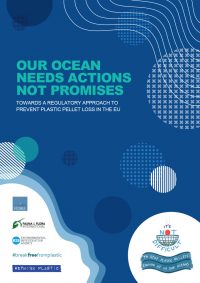Winning the fight against plastic pollution requires action at national and regional as well as global levels.
Our UK policy work seeks to secure ambitious legislative measures that will reduce plastic consumption and drive system change. EIA works closely with NGO partners through the Wildlife and Countryside Link Coalition to ensure timely and ambitious objectives and implementation.
Our regional (EU) policy work focuses on specific issues of particular concern, such as plastic pellets, fishing gear and agricultural plastics. Working together with a number of other NGOs within the Rethink Plastic alliance, we are heavily engaged in the development and implementation of key EU policy files, including the Port Reception Facilities Directive, Single Use Plastics Directive the Waste Framework Directive, and the Packaging and Packaging Waste Directive, among others.
Plastic Pellets
Plastic pellets (or ‘nurdles’) are the lentil-sized building blocks of the plastics industry that are melted and moulded into virtually every plastic product in existence. Up to 230,000 tonnes leak into the environment every year, making them the second largest source of direct microplastic pollution. This pollution has a devastating impact on wildlife and ecosystems.
Pellet pollution exists because of poor handling practices. We are advocating for strong EU legislation to mandate a ‘supply chain approach’ to pellet loss, that would essentially mean retailers and producers need to prove that best handling practices were used throughout the entire supply chain through a system of accreditations.
For more information, please read our summary briefing ‘Our Oceans Need Actions Not Promises’, or detailed briefing ‘Toward a Regulatory Approach to Plastic Pellet Loss.’
Plastic Pellets Under REACH
In January 2019, the European Chemicals Agency (ECHA) proposed a wide-ranging restriction on intentional uses of microplastics under its Registration, Evaluation, Authorisation and Restriction of Chemicals (REACH) Regulation. Under the current proposal, plastic pellets are derogated from any restriction, and would only have weak requirements for reporting and instructions on use and disposal (IFUD) with no additional requirements to reduce pellet loss on site or across the supply chain. In our new briefing, we challenge the EU Commission to enable the development of a dedicated EU Regulation on Plastic Pellet Loss by strengthening proposed reporting and labelling requirements under REACH. See our briefing here for more information.
Other European Legislation
Over the years, we have worked on multiple pieces of European legislation, advocating before the European Commission, European Parliament, and Member States and in Brussels and beyond.
This includes working on the revisions to the Waste Framework Directive (WFD) and Packaging and Packaging Waste Directive (PPWD) to reduce and improve management of plastic waste. It also includes, more recently, the Single-Use Plastics Directive and Port Reception Facilities (PRF) Directive to address the top plastic items found on beaches, including fishing gear, and improve the collection of plastic waste at ports and from ships.
The focus of these efforts is now on proper implementation. Together with the Rethink Plastic Alliance we have produced an implementation guide for policymakers on curbing sea-based sources of plastic pollution and another on moving away from single-use plastics.



